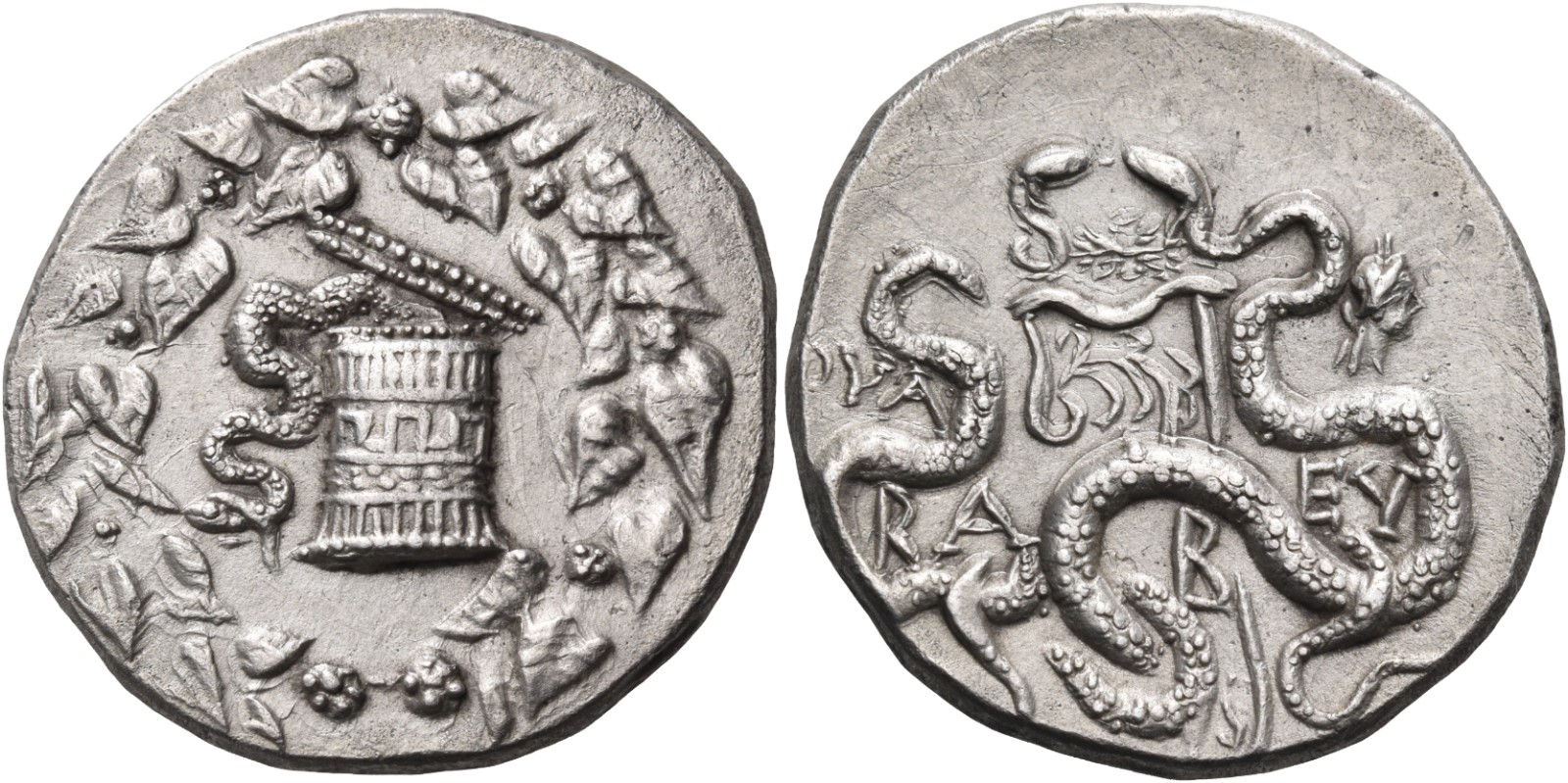H 235 - Apollonis, Stratoniceia et Thyatira, silver, cistophorus, 132-130 BC
From SILVER
132 BCE - 130 BCE Silver 1,343 kg
Description
| ObverseInscription or printing placed on the obverse.: | Basket (cista mystica) from which snake coils, around, ivy wreath with fruits |
| ReverseInscription or printing placed on the reverse.: | BA EY (Greek).Two snakes coiled around a bow case, to left, ΘΥA, to right, laureate (?) head to right (Apollo?), between snakes heads, thunderbolt, across the snakes, ΒΑ - Β - ΕΥ |
Mint and issuing power
| MintIdentifies the place of manufacture or issue of a numismatic object.: | Thyatira | Ancient regionAncient region.: | Lydia | Modern countryModern country: Turkey | AuthorityIdentifies the issuing power. The authority can be "pretended" when the name or the portrait of X is on the coin but he/she was not the issuing power. It can also be "uncertain" when there is no mention of X on the coin but he/she was the issuing power according to the historical sources: | Attalid Kingdom, Eumenes III Aristonicus (Attalid usurper, 133-129 BC) |
Chronology
| FromIdentifies the initial date in a range assigned in a numismatic context. | 132 BCE | toIdentifies the final date in a range assigned in a numismatic context.. | 130 BCE | PeriodTime period of the numismatic object.: Hellenistic 323-30 BC |
Physical description
| MetalThe physical material (usually metal) from which an object is made.: | Silver |
Median weightMedian of the weights of numismatic objects (in grams). in grams | 12.60 | DenominationTerm indicating the value of a numismatic object. Examples: tetradrachm, chalkous, denarius.: | cistophorus |
StandardStandard.: | Cistophoric |
Image

H235 Thyateira.jpg [1]
References
| Die study referencePublication of the study: | Kleiner - Noe 19771Kleiner - Noe 1977 | ||
| Coin series referenceReference to coin series study: | Sear II2Sear II, n° 4740, RQEMH3RQEMH, n° 235 | ||
Obverse dies distribution
| FrequencyFrequency of specimen in distribution. ᵖ | Number of obversesNumber of obverse dies. ᵖ (o) | % (o) | Number of coinsNumber of coins. (n) | % (n) | Die nameName(s) of the die(s). |
| 2 | 1 | 20 | 2 | 6.25 | 4 |
| 3 | 1 | 20 | 3 | 9.38 | 5 |
| 6 | 1 | 20 | 6 | 18.75 | 3 |
| 7 | 1 | 20 | 7 | 21.88 | 1 |
| 14 | 1 | 20 | 14 | 43.75 | 2 |
| Total | 5 of 5 | 100 | 32 of 32 | 100.01 |
Reverse dies distribution
no distribution is available
Quantification
| Number of obversesNumber of obverse dies. ᵖ (o) | 5 | Number of singletons (o1)The number of singleton coins. ᵖ | |
| Number of reverse diesNumber of reverse dies. (r) | 23 | Number of coinsNumber of coins. (n) | 32 |
| Coins per obverse dieNumber of coins per obverse die. (n/o) | 6.4 | Coins per reverse dieNumber of coins per reverse die. (n/r) | 1.39 |
| Reverse per obverse ratioRatio of obverse dies divided by reverse dies. (r/o) | 4.6 | Percentage of singletons (o1)number of coins (n) divided by the number of singletons (o1) ᵖ | % |
| Original number of dies (O) (Carter 1983 formula)The estimation of the number of coins according to Carter 1983 ᵖ | 5.33 | Coins struck if 20,000 as average productivity per dieCoins made if the average productivity for obverses (according to Carter) is 20,000. ᵖ | 106,600 |
| Original number of dies (O) (Esty 2011 formula)The estimation of the number of coins according to the singleton formula in Esty 2011 ᵖ (O) | 5.93 | Survival rate if 20,000 as average productivity per dieSurvival rate if average productivity is 20,000. ᵖ | 0.00030 |
| Coverage (o = % of O) (Esty 1984 formula)Esty 1984 - coverage (% of O) ᵖ (o = % of O) | % | Die productivity if survival rate 1/2,000Average productivity if survival rate is 1/2,000. ᵖ | 12,007.5 |
| Weight of silver (in kg) if 20,000 coins per die (O = Carter formula)Carter 1983 * Median weight * 20000 (*10 if gold or electrum) ᵖ | 1,343 kg <br /> 1,343 kg | Die productivity if survival rate 1/5,000Average productivity if survival rate is 1/5,000. ᵖ | 30,018.76 |
Remarks
Most likely one single workstation
References
- ^ Kleiner, Fred S. - Noe, Sydney P. (1977), The early Cistophoric coinage, Numismatic Studies 14, New York, 129 p., 38 pl.
- ^ Sear, David R. (1979), Greek coins and their values. Vol. II, Asia and North Africa, London, xlviii, p. 317-762
- ^ Callataÿ, François de (1997), Recueil quantitatif des émissions monétaires hellénistiques, Numismatique Romaine, Wetteren, X + 341 p.